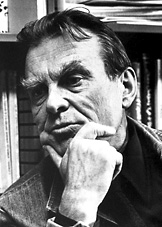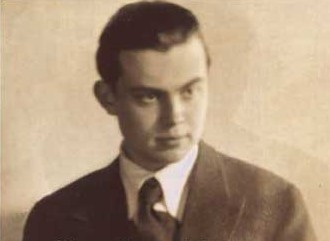Vilnius, Lithuania. In a year of commemorations, panegyrics, readings, and discourse around the world, occasioned by the centenary of Czeslaw Milosz, one small memorial will slip by, largely unnoticed: A plaque honoring the poet has been installed on the building where, ninety years ago, he attended secondary school. The plaque reads:
Czeslaw Milosz, Nobel Prize laureate and honorary citizen of Vilnius, studied in this building – the former Zygmunt August School – during the years 1921-1929.
 Imagine this building. Has anyone been to Vilnius? Anyone seen the place? Imagine young Czeslaw making his way there every day, jostling with friends, his beautiful brow knitting at their antics. Perhaps he participates. There he is in a hot classroom, holding his head in his hand, elbow propped on his desk, fingers in his hair, listening to the lesson, or distracted. His mind was awakening in a world still electric from World War I. The air he and his classmates breathed was coming on swift currents from Red Square, swelling the lungs of revolutionaries as well as peasants isolated in the taiga who may have only just heard that the Tsar was no more. What jokes did he laugh at? What made him blush? Just the year before he entered the Zygmunt August School, this city, Vilnius (then called Wilno) had been captured by Poland and made the capital of the Republic of Central Lithuania. In his second year, this new geopolitical entity was incorporated into the Polish Second Republic. Economic hardship exacerbated by crop failures across Eastern Europe was drying the tinder of anti-semitism. Unrest was the constant during those days at Zygmunt August. His mind learned restlessness.
Imagine this building. Has anyone been to Vilnius? Anyone seen the place? Imagine young Czeslaw making his way there every day, jostling with friends, his beautiful brow knitting at their antics. Perhaps he participates. There he is in a hot classroom, holding his head in his hand, elbow propped on his desk, fingers in his hair, listening to the lesson, or distracted. His mind was awakening in a world still electric from World War I. The air he and his classmates breathed was coming on swift currents from Red Square, swelling the lungs of revolutionaries as well as peasants isolated in the taiga who may have only just heard that the Tsar was no more. What jokes did he laugh at? What made him blush? Just the year before he entered the Zygmunt August School, this city, Vilnius (then called Wilno) had been captured by Poland and made the capital of the Republic of Central Lithuania. In his second year, this new geopolitical entity was incorporated into the Polish Second Republic. Economic hardship exacerbated by crop failures across Eastern Europe was drying the tinder of anti-semitism. Unrest was the constant during those days at Zygmunt August. His mind learned restlessness.
And to think, it was all yet to come, all that would lead him to spend the rest of his days diving for the Underworld in search of those he believed must not be left there. Being descended from a noble family still meant something in those days. Not yet, his continent’s mass deportations and relocations, the starvation. Still ahead, his study of law, that increasingly ironic enterprise. Still ahead, Paris, and the intellectual and spiritual influence of his famous older cousin, Oscar Milosz, francophone poet and Swedenborgian Catholic. Not yet, the German occupation, the decimation by the Nazis, not only of Jewish Europe, of Gypsie, gay, disabled, non-aryan Europe, but of thought, of conscience, of the non-animal in Europe. Not yet, the Warsaw Uprising, the Warsaw defeat. Not yet, the hope in communism gutted in the abattoir of Stalinism, the gulags, the rapes, soviet soldiers urinating in the foyers of Polish and Baltic apartments. Still ahead, his first volume of poetry. Still ahead, the destruction of his fellow poets, that generation of Polish “Columbuses” (Edward Hirsch), a holocaust whose burden he would feel upon his shoulders to the end of his life. And then, incredibly, Berkeley. Not yet.
We bring our school years forward with us through time, all the way. Something of the Zygmunt August School will have been with Milosz on August 14th, 2004. What that would have been is unknowable to us, but a core feature of his identity, whether learned there or (more likely) at some point nearer his birth, is dramatized by the school’s very name: Zygmunt II August was both the Grand Duke of Lithuania and the last un-elected king of Poland. Lithuania. Poland. Every day, after breakfast, he carried his growing body and mind through those doors swinging open under that name, an ever-present reminder of his country’s centuries long struggle to know itself, a project which became his own. Somewhere along the line he learned to say of himself, “I am a Lithuanian to whom it was not given to be a Lithuanian.”
In this building, presumably no longer a school, Czeslaw Milosz grew from short-trousered childhood into adolescence. Someone will have been the focus of his first look of poignant longing. What did he say to her? Of her? What didn’t he say? Helen Vendler writes of the mature poet, “Like most lyric poets, Milosz was probably not by nature very much a social being, but, given the situation of his life, he cannot help being a historical one.” When did this order of things dawn on him? How did it impact his awakening heart?
 At the beginning of the second decade of this century, a plaque has been placed on a building, memorial to a boy who went to school there in the third decade of the last. The plaque will be seen every day for as long as the building stands. But the boy is no more. The man is no more. So very much is no more. And we all know how the life of plaques on buildings goes. Count up the number of people who will read it even this year and you’ll arrive at piece of statistical irrelevence. Hard to imagine what those few who take the time to read this plaque will make of it even one generation out. But, there is the poetry. The poetry remains. And, for now, at least, it seems it will remain for a long time.
At the beginning of the second decade of this century, a plaque has been placed on a building, memorial to a boy who went to school there in the third decade of the last. The plaque will be seen every day for as long as the building stands. But the boy is no more. The man is no more. So very much is no more. And we all know how the life of plaques on buildings goes. Count up the number of people who will read it even this year and you’ll arrive at piece of statistical irrelevence. Hard to imagine what those few who take the time to read this plaque will make of it even one generation out. But, there is the poetry. The poetry remains. And, for now, at least, it seems it will remain for a long time.
MEANING
–When I die, I will see the lining of the world.
The other side, beyond bird, mountain, sunset.
The true meaning, ready to be decoded.
What never added up will add up,
What was incomprehensible will be comprehended.
–And if there is no lining to the world?
If a thrush on a branch is not a sign,
But just a thrush on the branch? If night and day
Make no sense following each other?
And on this earth there is nothing except this earth?
–Even if that is so, there will remain
A word wakened by lips that perish,
A tireless messenger who runs and runs
Through interstellar fields, through the revolving galaxies,
And calls out, protests, screams.
Happy birthday, Czeslaw Milosz. Give our regards to Eurydice.
